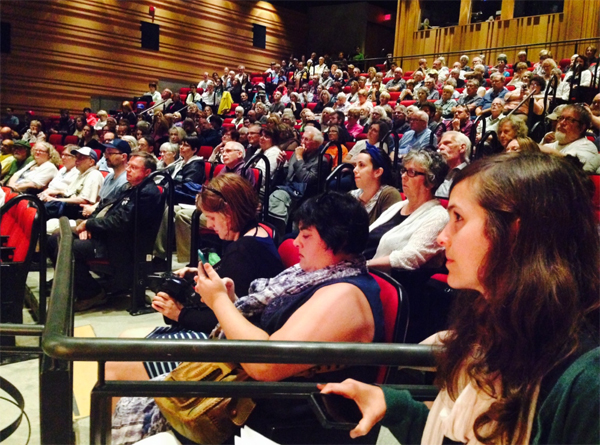Please support our coverage of democratic movements and become a supporter of rabble.ca.
As I stood on the beach and looked out across Vancouver’s English Bay it was an otherwise beautiful view punctuated by a dozen tankers with bright lights polluting the darkening sky. It was the night before the first of 10 democracy town halls the Council of Canadians was about to hold from coast to coast from April 30 to June 24, in partnership with CUPE, Unifor, PSAC, and the Directors Guild of Canada.
The shadows had grown too long as the sun set to see the residue from the oil spill there three weeks earlier. Yet the risks of tar sands expansion and increased tanker traffic coupled with the real costs of cuts to the local coast guard remained all too clear.
In Vancouver, austerity means an oil-soaked coastline, leaving the general public to clean up the mess of nine years of government cuts. This spill is one of a long list of warning signs that highlight why this government is past its best-before date. And it’s one of a long list of reasons why people across the country are increasingly saying it’s time for change.
On the road to get out the vote
There’s a lot at stake in the upcoming federal election, for our communities and for our collective future. From coast to coast to coast people are coming together to organize so that we can take a different path from the one we’ve been on the past nine years.
The series of packed town halls from coast to coast highlighted what we can do about it together. We heard from over 30 inspiring speakers, discussed and debated the issues we’re facing, and have helped communities get organized to change the game before, during, and after the election. The town halls were followed by door-to-door canvassing, which is continuing through the summer, and is already increasing the potential for change in October. You can see some highlights from the tour here.
We visited 10 of the ridings that could decide the outcome in the federal election in Vancouver, Ottawa, Winnipeg, Saskatoon, Bridgewater, Moncton, Scarborough, Toronto, London, and Courtney/Comox.
What next?
We can bring about change by getting organized in our communities and we can start with all of us taking the voter pledge right now.
The voter pledge is our commitment to each other to vote in the next election and to get at least two other people to commit to voting too. Even for those of us who already plan on voting, signing the pledge is an important way of leading by example to increase voter turnout.
One of the key things each of us can do for the next election is getting at least two people we know to vote as well. You can take the voter pledge right now by visiting canadians.org/voterpledge or texting “VOTE” to 123411.
Changing the math for the 2015 election
But what if we didn’t stop at voting and bringing two people with us? What if each of us could get 20 more people to commit to voting in the next election? Or 200?
That may sound intimidating or impossible or ridiculous, especially if you’ve never done any door canvassing. But believe me; knocking on that first door is a lot harder than knocking on the second. And it gets easier from there.
By now you may have seen the math. Harper’s majority was won by 6,201 votes across 14 ridings. This means we have the power to change the outcome of the next election by getting organized street by street, door by door. Together by reaching out to voters in our communities we can build a tidal wave of change in October.
That’s why every step we take down the streets we’ll be canvassing is a step Stephen Harper doesn’t want us to take. Every door we knock on in our communities is a door he doesn’t want us to knock on. Every person we talk to at the local farmers market, on every patio, at every music festival and BBQ this summer is someone Harper doesn’t want us to talk to.
That’s why the Harper government has gone out of its way to make voter suppression the law of the land with the so-called “Fair” Elections Act. And that’s not a done deal. We’re challenging it in court and a ruling from the Ontario Superior Court is anticipated by July 20 on whether to grant an injunction that could reinstate the Voter Information Card as valid ID for the 2015 election.
Let’s ensure our communities go vote for change this fall
The bottom line is Harper wins if people stay home. And that’s why increasing voter turnout can change the game by knocking down the doors of Harper’s re-election strategy.
And so let’s take those steps and knock on those doors, together, to make sure as many of our friends and neighbours go vote in the next election.
Want to help increase voter turnout in your community? Get in touch and let us know.
Together let’s defend and expand democracy before, during, and after the next election.
Please support our coverage of democratic movements and become a supporter of rabble.ca.



